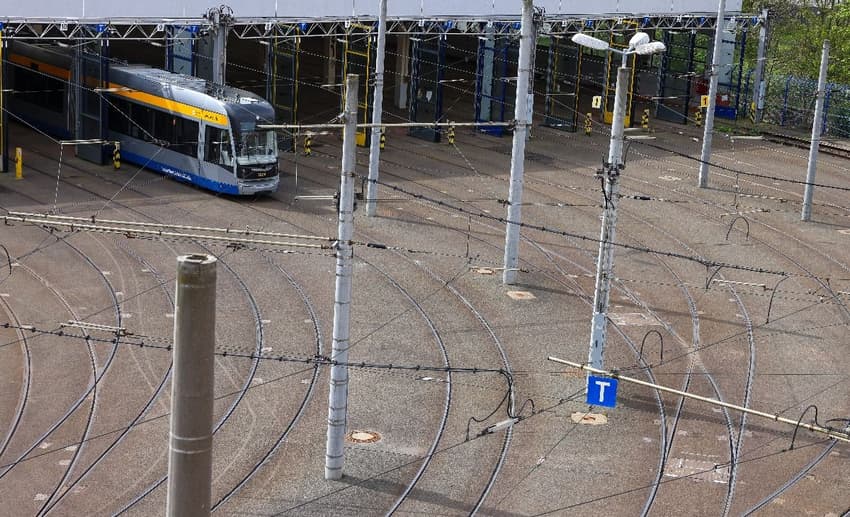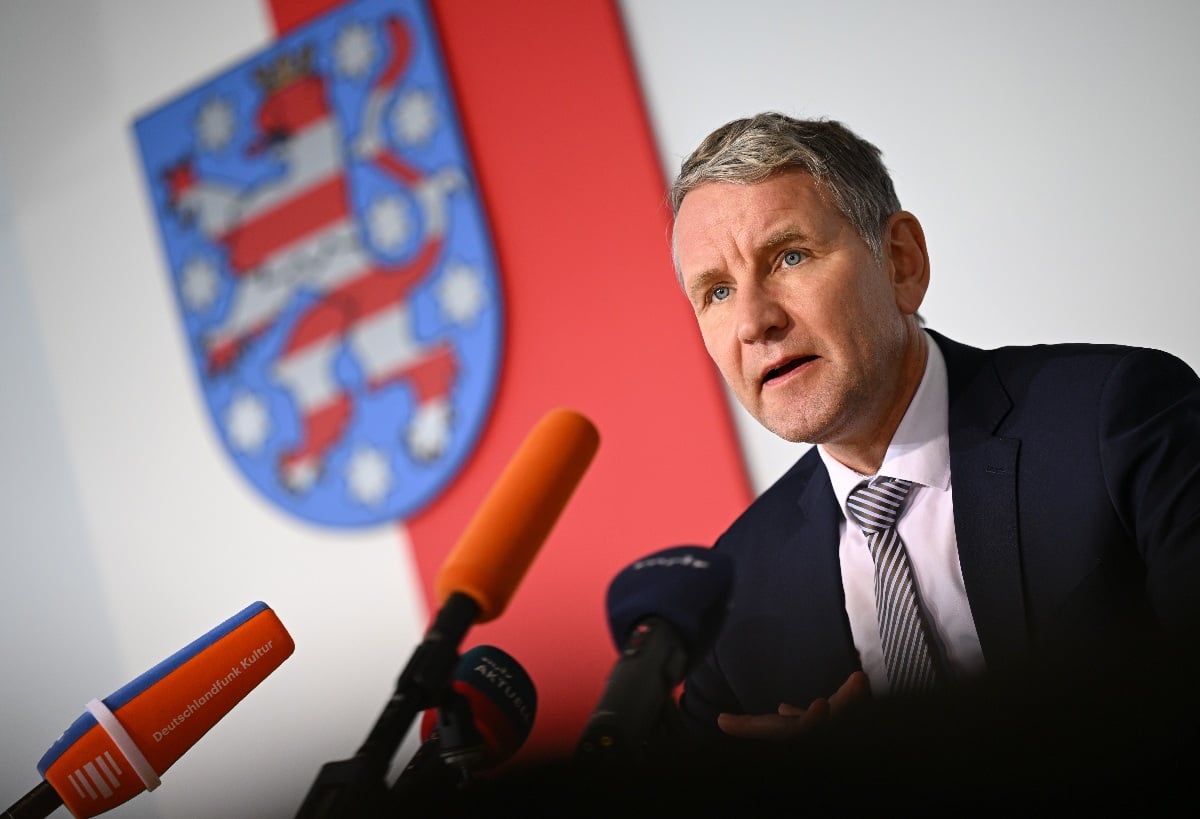Today in Germany: A roundup of the latest news on Friday

Travel disruption as strikes in parts of the country continue, alarm after two suspects arrested over suspicion of spying for Russia and planning attacks and more news from around Germany.
Travel disruption across parts of Germany as strikes continue
Passengers facing disruption in parts of southern Germany and Saxony due to strikes.
All day on Thursday and Friday, local public transport was set to come to a standstill in parts of Baden-Württemberg.
Local public transport companies in Stuttgart, Karlsruhe, Heilbronn, Freiburg, Baden-Baden, Esslingen and Constance are also affected by the action.
Bus drivers with private operators are also on strike in Rhineland-Palatinate this week, with the cities of Koblenz, Worms, Zweibrücken and Mainz affected, as well as intercity traffic in many regions.
There is also a partial strike on local transport in Saxony, with disruption expected in Dresden, Zwickau or Chemnitz.
READ ALSO: Where public transport strikes are hitting Germany this week
Two arrested on suspicion of spying for Russia and planning attacks on Germany
Investigators have arrested two German-Russian men on suspicion of spying for Russia and planning attacks in Germany - including on US army targets - to undermine military support for Ukraine, prosecutors said on Thursday.
The pair, identified as Dieter S. and Alexander J., were arrested in Bayreuth in the south-eastern state of Bavaria on Wednesday, federal prosecutors said in a statement.
The main accused, Dieter S., is alleged to have scouted potential targets for attacks, "including facilities of the US armed forces" stationed in Germany.
Russia's ambassador to Berlin was summoned by the foreign ministry following the arrests.
Germany would not "allow Putin to bring his terror to Germany", Foreign Minister Annalena Baerbock subsequently said on X.
The suspicion that Putin is recruiting agents in our country to carry out attacks on German soil is extremely grave. We will not allow Putin to bring his terror to Germany. This was communicated to the Russian ambassador today during a summons. @ABaerbock
— GermanForeignOffice (@GermanyDiplo) April 18, 2024
But Russian officials rejected the accusations.
"No evidence was presented to prove the detainees' plans or their possible connection to representatives of Russian structures," the Russian embassy in Berlin said in a post on X.
Police have searched both men's homes and places of work.
They are suspected of "having been active for a foreign intelligence service" in what prosecutors described as a "particularly serious case" of espionage.
Interior Minister Nancy Faeser likewise called the allegations "a particularly serious case of suspected agent activity for (Vladimir) Putin's criminal regime".
"We will continue to thwart such threat plans," she said, reiterating Germany's steadfast support for Ukraine.
"We will can never accept that espionage activities in Germany take place," Chancellor Olaf Scholz said at a meeting of EU leaders in Brussels.
German far-right politician in court for using Nazi slogan
One of Germany's most controversial politicians went on trial on Thursday for using a banned Nazi slogan in the run-up to key regional elections that could see him crowned the country's first far-right state premier.
Björn Höcke, 52, is the head of the far-right Alternative for Germany (AfD) party in Thuringia, one of three former East German states where the party is leading opinion polls ahead of regional elections in September.

Björn Höcke (AfD), parliamentary group leader in the Thuringian state parliament, speaks to journalists during a press conference in December 2023. Photo: picture alliance/dpa | Martin Schutt
He stands accused of using the phrase "Alles fúr Deutschland" ("Everything for Germany"), once a motto of the so-called Sturmabteilung paramilitary group that played a key role in Adolf Hitler's rise to power, during a 2021 campaign rally.
The phrase is illegal in modern-day Germany, along with the Nazi salute and other slogans and symbols from that era.
The former high school history teacher claims not to have been aware that the phrase had been used by the Nazis, but prosecutors believe Hoecke uttered the words in full knowledge of their "origin and meaning".
Several hundred protesters gathered outside the court in the central city of Halle on Thursday holding banners with slogans such as "Stop the AfD".
Höcke entered the courtroom wearing a dark suit and a light blue tie.
If convicted, he faces up to three years in prison -- something that could complicate his election bid.
The trial, set to last until mid-May, is one of several controversies the AfD is battling ahead of EU elections in June and regional elections in the autumn in Thuringia, Brandenburg and Saxony.
Bavaria launches 'speed camera marathon'
Drivers should be careful in the southern state of Bavaria as a 24-hour 'Blitzermarathon' got underway at 6am on Friday.
Measurements will be taken at over 1,500 locations over the course of the day, with patrols across the state.
The action is part of a Europe-wide campaign organised by the European roads policing network Roadpol. The focus in Bavaria is on Friday, but other federal states such as Baden-Württemberg, Rhineland-Palatinate and Saxony have been monitoring throughout the week.
Bavaria is one of the few German states that announces in advance where speed cameras will be located. The table in this article by local broadcaster BR24 shows where speed measurements will be ramped up on Friday.
Munich is a particular target for the campaign, with speed patrols being stepped up.
According to Bavaria's interior minister Joachim Hermann, of the CSU, the aim is to increase awareness of adhering to speed limits.
"Speed that is too high and inappropriate is one of the main causes of serious traffic accidents,” he said, adding that "125 people died in speeding accidents on Bavaria's roads last year".
READ ALSO: The key traffic violations and fines to know about in Germany
With reporting by Rachel Loxton
Comments
See Also
Travel disruption across parts of Germany as strikes continue
Passengers facing disruption in parts of southern Germany and Saxony due to strikes.
All day on Thursday and Friday, local public transport was set to come to a standstill in parts of Baden-Württemberg.
Local public transport companies in Stuttgart, Karlsruhe, Heilbronn, Freiburg, Baden-Baden, Esslingen and Constance are also affected by the action.
Bus drivers with private operators are also on strike in Rhineland-Palatinate this week, with the cities of Koblenz, Worms, Zweibrücken and Mainz affected, as well as intercity traffic in many regions.
There is also a partial strike on local transport in Saxony, with disruption expected in Dresden, Zwickau or Chemnitz.
READ ALSO: Where public transport strikes are hitting Germany this week
Two arrested on suspicion of spying for Russia and planning attacks on Germany
Investigators have arrested two German-Russian men on suspicion of spying for Russia and planning attacks in Germany - including on US army targets - to undermine military support for Ukraine, prosecutors said on Thursday.
The pair, identified as Dieter S. and Alexander J., were arrested in Bayreuth in the south-eastern state of Bavaria on Wednesday, federal prosecutors said in a statement.
The main accused, Dieter S., is alleged to have scouted potential targets for attacks, "including facilities of the US armed forces" stationed in Germany.
Russia's ambassador to Berlin was summoned by the foreign ministry following the arrests.
Germany would not "allow Putin to bring his terror to Germany", Foreign Minister Annalena Baerbock subsequently said on X.
The suspicion that Putin is recruiting agents in our country to carry out attacks on German soil is extremely grave. We will not allow Putin to bring his terror to Germany. This was communicated to the Russian ambassador today during a summons. @ABaerbock
— GermanForeignOffice (@GermanyDiplo) April 18, 2024
But Russian officials rejected the accusations.
"No evidence was presented to prove the detainees' plans or their possible connection to representatives of Russian structures," the Russian embassy in Berlin said in a post on X.
Police have searched both men's homes and places of work.
They are suspected of "having been active for a foreign intelligence service" in what prosecutors described as a "particularly serious case" of espionage.
Interior Minister Nancy Faeser likewise called the allegations "a particularly serious case of suspected agent activity for (Vladimir) Putin's criminal regime".
"We will continue to thwart such threat plans," she said, reiterating Germany's steadfast support for Ukraine.
"We will can never accept that espionage activities in Germany take place," Chancellor Olaf Scholz said at a meeting of EU leaders in Brussels.
German far-right politician in court for using Nazi slogan
One of Germany's most controversial politicians went on trial on Thursday for using a banned Nazi slogan in the run-up to key regional elections that could see him crowned the country's first far-right state premier.
Björn Höcke, 52, is the head of the far-right Alternative for Germany (AfD) party in Thuringia, one of three former East German states where the party is leading opinion polls ahead of regional elections in September.

He stands accused of using the phrase "Alles fúr Deutschland" ("Everything for Germany"), once a motto of the so-called Sturmabteilung paramilitary group that played a key role in Adolf Hitler's rise to power, during a 2021 campaign rally.
The phrase is illegal in modern-day Germany, along with the Nazi salute and other slogans and symbols from that era.
The former high school history teacher claims not to have been aware that the phrase had been used by the Nazis, but prosecutors believe Hoecke uttered the words in full knowledge of their "origin and meaning".
Several hundred protesters gathered outside the court in the central city of Halle on Thursday holding banners with slogans such as "Stop the AfD".
Höcke entered the courtroom wearing a dark suit and a light blue tie.
If convicted, he faces up to three years in prison -- something that could complicate his election bid.
The trial, set to last until mid-May, is one of several controversies the AfD is battling ahead of EU elections in June and regional elections in the autumn in Thuringia, Brandenburg and Saxony.
Bavaria launches 'speed camera marathon'
Drivers should be careful in the southern state of Bavaria as a 24-hour 'Blitzermarathon' got underway at 6am on Friday.
Measurements will be taken at over 1,500 locations over the course of the day, with patrols across the state.
The action is part of a Europe-wide campaign organised by the European roads policing network Roadpol. The focus in Bavaria is on Friday, but other federal states such as Baden-Württemberg, Rhineland-Palatinate and Saxony have been monitoring throughout the week.
Bavaria is one of the few German states that announces in advance where speed cameras will be located. The table in this article by local broadcaster BR24 shows where speed measurements will be ramped up on Friday.
Munich is a particular target for the campaign, with speed patrols being stepped up.
According to Bavaria's interior minister Joachim Hermann, of the CSU, the aim is to increase awareness of adhering to speed limits.
"Speed that is too high and inappropriate is one of the main causes of serious traffic accidents,” he said, adding that "125 people died in speeding accidents on Bavaria's roads last year".
READ ALSO: The key traffic violations and fines to know about in Germany
With reporting by Rachel Loxton
Join the conversation in our comments section below. Share your own views and experience and if you have a question or suggestion for our journalists then email us at [email protected].
Please keep comments civil, constructive and on topic – and make sure to read our terms of use before getting involved.
Please log in here to leave a comment.